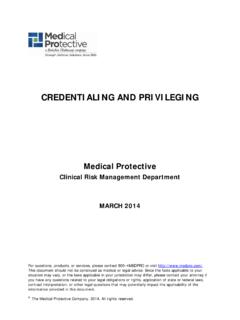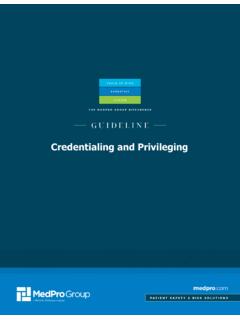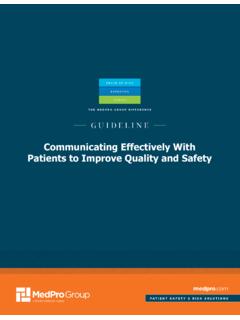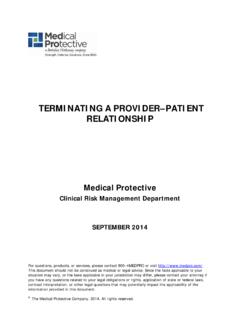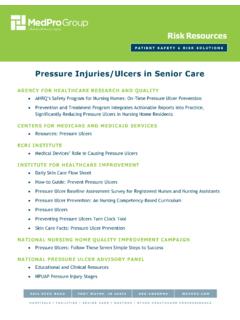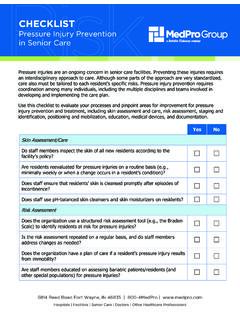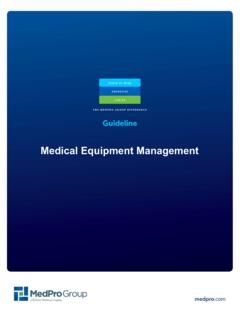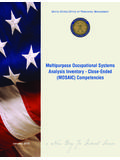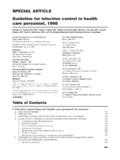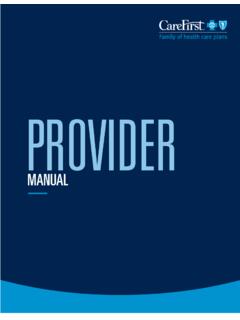Transcription of Developing an Effective Compliance Plan: A Guide for ...
1 Developing an Effective Compliance plan : A Guide for Healthcare Practices This document should not be construed as medical or legal advice. Because the facts applicable to your situation may vary, or the laws applicable in your jurisdiction may differ, please contact your attorney or other professional advisors if you have any questions related to your legal or medical obligations or rights, state or federal laws, contract interpretation, or other legal questions. MedPro Group is the marketing name used to refer to the insurance operations of The Medical Protective Company, Princeton Insurance Company, PLICO, Inc. and MedPro RRG Risk Retention Group. All insurance products are underwritten and administered by these and other Berkshire Hathaway affiliates, including National Fire & Marine Insurance Company. Product availability is based upon business and regulatory approval and may differ between companies.
2 2018 MedPro Group Inc. All rights reserved. Contents Introduction .. 1. Objectives .. 1. Background .. 1. The Importance of a Compliance plan .. 2. The Fraud and Abuse Laws .. 3. The Anti-Kickback Statute .. 3. The Physician Self-Referral Law (Stark Law) .. 4. The False Claims Act .. 4. Exclusion Statute .. 5. Civil Monetary Penalties Law .. 6. The Seven Fundamental Elements of an Effective Compliance Program .. 6. Element One: Implementing Written Policies, Procedures, and Standards of Conduct .. 7. Element Two: Designating a Compliance Officer and Compliance Committee to Provide Program Oversight .. 8. Element Three: Using Due Diligence in the Delegation of Authority .. 9. Element Four: Educating Employees and Developing Effective Lines of Communication .. 9. Element Five: Conducting Internal Monitoring and Auditing .. 11. Element Six: Enforcing Standards Through Well-Publicized Disciplinary Guidelines.
3 12. Element Seven: Responding Promptly to Detected Offenses and Undertaking Corrective Action .. 12. Conclusion .. 12. Resources .. 13. Endnotes .. 14. Guideline: Developing an Effective Compliance plan : A Guide for Healthcare Practices 1. Introduction A Compliance plan is a formal statement of a healthcare practice's intention to conduct itself ethically in regard to business operations, government regulations, and patient services and care. The purpose of a formal Compliance plan is twofold: (1) it provides a blueprint for the practice's Compliance program and accomplishing the aforementioned goals, and (2) it encourages employees to report unethical conduct. Federal law requires healthcare practices to develop and implement formal Compliance programs. 1 This guideline provides an overview of the role of Compliance in healthcare and discusses how practices can take steps to ensure they are meeting Compliance obligations.
4 However, it's important to note that Compliance is very complex, and new developments in audit focuses occur annually. Healthcare practices should consult legal counsel to provide detailed guidance on Compliance program development and implementation. Objectives The objectives of this guideline are to: Explain why Compliance plans are important for healthcare practices Review federal fraud and abuse laws Describe the seven essential elements of an Effective Compliance plan Background Since 1976, the Department of Health and Human Services' Office of Inspector General (HHS-OIG) has been working to prevent fraud, waste, and abuse in federally funded healthcare programs, such as Medicare, Medicaid, and the Children's Health Insurance Program (CHIP). HHS-OIG's primary function is to protect the integrity of HHS programs as well as the health and welfare of program beneficiaries. HHS-OIG has published voluntary Compliance program guidance for individual and small group healthcare practices for a number of years.
5 In the 1990s, HHS-OIG began providing voluntary Compliance tools and resources to help healthcare providers avoid submitting erroneous claims and engaging in unlawful conduct involving federal healthcare programs. Guideline: Developing an Effective Compliance plan : A Guide for Healthcare Practices 2. However, because HHS-OIG's guidance was voluntary, not all healthcare providers and organizations felt compelled to develop Compliance programs. With the implementation of the Patient Protection and Affordable Care Act (ACA) in 2010, Compliance programs became mandatory. Section 6401 of the ACA stipulates that healthcare providers must establish Compliance programs as a condition of enrollment in Medicare, Medicaid, or the Children's Health Insurance Program (CHIP). 2. The Importance of a Compliance plan Having a Compliance plan is important for many reasons beyond the most obvious it's required by law.
6 An Effective Compliance plan is crucial for preventing fraudulent claims and erroneous billing, preparing for potential audits, and avoiding ethical conflicts in business operations and patient care services. Additionally, if noncompliance with the law results in an HHS-OIG complaint and investigation, the consequences can be significant. Merely not understanding the law or failing to provide Compliance training for staff usually is not a sufficient excuse for violations. The range of possible penalties that the government can impose for submitting fraudulent or erroneous claims or violating state or federal fraud and abuse laws include completion of a corporate integrity agreement; exclusion from Medicare, Medicaid, and CHIP programs; civil and criminal penalties; and/or a referral to the provider's state medical board. Not understanding the law or failing to provide Compliance By implementing and adhering to the requisite training for staff usually is not a Compliance plan , healthcare providers and sufficient excuse for violations.
7 Practices will generally meet their legal obligations and send a clear message to staff and the public that the practice is committed to conducting itself in an ethical manner, promoting good employee conduct, and providing quality patient care. Guideline: Developing an Effective Compliance plan : A Guide for Healthcare Practices 3. The Fraud and Abuse Laws All healthcare administrators and practicing healthcare providers should have at least a basic understanding of state and federal fraud and abuse laws. The federal fraud and abuse laws that apply to healthcare providers are: The Anti-Kickback Statute The Physician Self-Referral Law (Stark Law). The False Claims Act The Exclusion Authorities The Civil Monetary Penalties Law The government agencies responsible for enforcing these laws are the Department of Justice, HHS-OIG, and the Centers for Medicare & Medicaid Services (CMS). This section will provide a brief overview of these important laws affecting all healthcare providers, organizations, and vendors.
8 However, the information provided herein is for general reference only. For more detailed information about these laws or for specific questions, healthcare practices should work with their legal counsel. The Anti-Kickback Statute The Anti-Kickback Statute 3 prohibits the knowing and willful offering, paying, soliciting, or receiving of anything of value ( kickbacks ) to induce or reward patient referrals or the generation of business involving any item or service payable by federal Example of an Anti-Kickback Statute healthcare programs. 4 This statute Violation has safe harbor provisions that A healthcare provider accepts money or gifts from a protect certain business pharmaceutical or durable medical equipment arrangements; however, very company in exchange for the provider referring specific requirements must first be patients to that vendor. met for those provisions to apply. Guideline: Developing an Effective Compliance plan : A Guide for Healthcare Practices 4.
9 Violations of the Anti-Kickback Statute can result in administrative sanctions, fines, jail terms, and exclusion from participation in federal healthcare programs. The HHS-OIG warns that healthcare providers are an attractive target for kickback schemes because they are a potential source of referrals for other healthcare providers, pharmaceutical organizations, and medical supply companies. The Physician Self-Referral Law (Stark Law). The Stark Law 5 prohibits healthcare providers from referring Medicare or Medicaid patients for certain designated health services to an entity with which the healthcare provider or an immediate family member has a financial relationship, unless an exception applies under the law. 6 A financial relationship may include any form of ownership interest, an investment interest, or some other form of compensation arrangement. The Stark Law also prohibits the entity Example of a Stark Law Violation providing the designated health services An orthopaedic physician refers all of his from submitting claims to Medicare or patients to his privately owned physical Medicaid for services that involved a therapy center without giving the patients prohibited referral.
10 Other options or notice that he owns the Examples of designated health services physical therapy center. include clinical laboratory services, any form of outpatient therapy services ( , physical, occupational, and speech therapy), radiology and certain other imaging services, and durable medical equipment and supplies. The False Claims Act The civil False Claims Act 7 prohibits the submission of claims for payment to Medicare or Medicaid that the healthcare provider knows or should have known to be false or fraudulent. Penalties for filing false claims may be up to three times the actual loss plus $21,916 per claim filed. 8 Further, an analogous criminal False Claims Act 9 can result in criminal penalties and imprisonment for submitting false claims. Guideline: Developing an Effective Compliance plan : A Guide for Healthcare Practices 5. The False Claims Act includes a Example of a False Claims Act Violation whistleblower provision (qui tam action) that allows individuals to file a A physician submits claims for payment to a lawsuit on behalf of the United States federally funded healthcare program for if they have knowledge that an procedures that were not actually performed or organization is defrauding the for treatments/services that were medically government.
